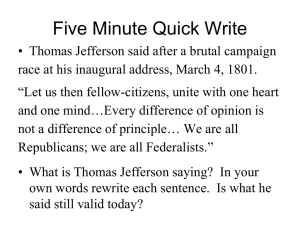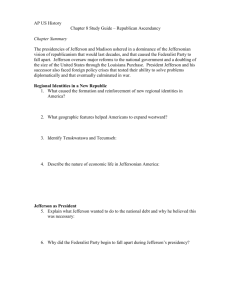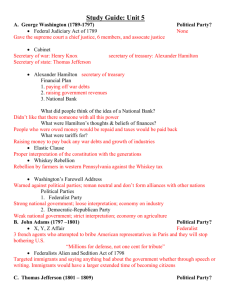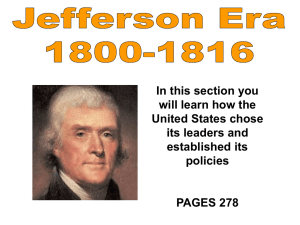Chapter 11: Triumphs and Travails of the Jeffersonian Republic
advertisement
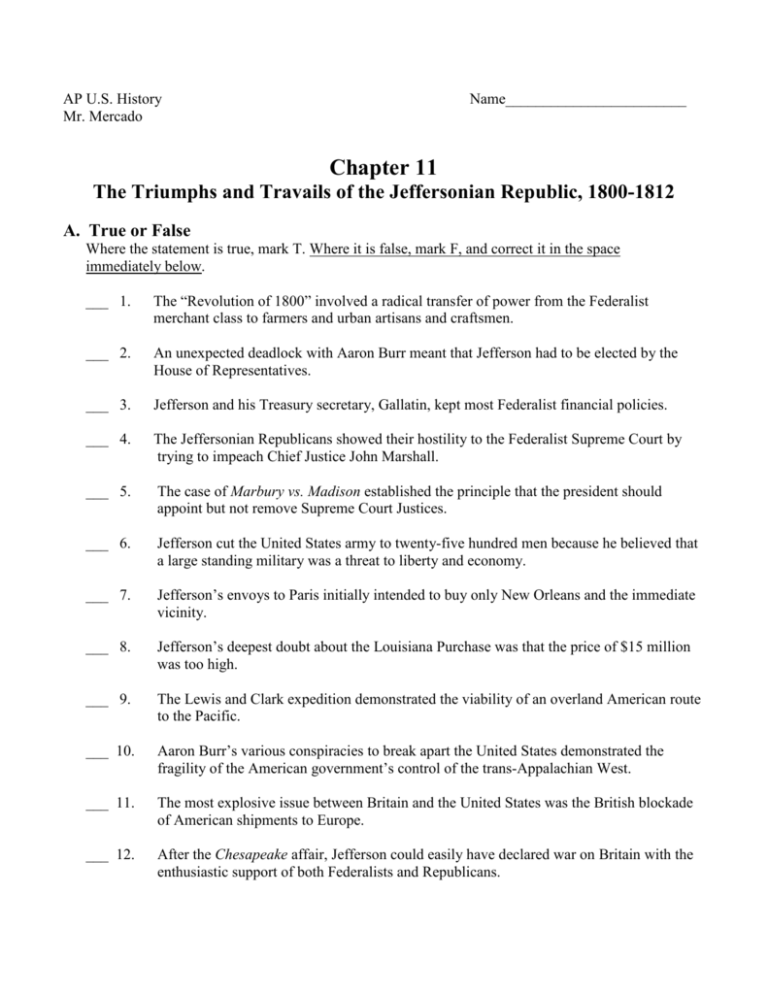
AP U.S. History Mr. Mercado Name________________________ Chapter 11 The Triumphs and Travails of the Jeffersonian Republic, 1800-1812 A. True or False Where the statement is true, mark T. Where it is false, mark F, and correct it in the space immediately below. ___ 1. The “Revolution of 1800” involved a radical transfer of power from the Federalist merchant class to farmers and urban artisans and craftsmen. ___ 2. An unexpected deadlock with Aaron Burr meant that Jefferson had to be elected by the House of Representatives. ___ 3. Jefferson and his Treasury secretary, Gallatin, kept most Federalist financial policies. ___ 4. The Jeffersonian Republicans showed their hostility to the Federalist Supreme Court by trying to impeach Chief Justice John Marshall. ___ 5. The case of Marbury vs. Madison established the principle that the president should appoint but not remove Supreme Court Justices. ___ 6. Jefferson cut the United States army to twenty-five hundred men because he believed that a large standing military was a threat to liberty and economy. ___ 7. Jefferson’s envoys to Paris initially intended to buy only New Orleans and the immediate vicinity. ___ 8. Jefferson’s deepest doubt about the Louisiana Purchase was that the price of $15 million was too high. ___ 9. The Lewis and Clark expedition demonstrated the viability of an overland American route to the Pacific. ___ 10. Aaron Burr’s various conspiracies to break apart the United States demonstrated the fragility of the American government’s control of the trans-Appalachian West. ___ 11. The most explosive issue between Britain and the United States was the British blockade of American shipments to Europe. ___ 12. After the Chesapeake affair, Jefferson could easily have declared war on Britain with the enthusiastic support of both Federalists and Republicans. Kennedy Ch. 11 Homework Packet Page 2 ___ 13. Jefferson’s embargo badly hurt southern and western farmers as well as Federalist New England. ___ 14. The Shawnee leaders Tecumseh and Tenskwatawa successfully organized a great Indian confederacy aimed at stemming whit expansion and reviving Indian culture.. The War of 1812 was promoted largely by New Englanders angry over British violation of American freedom of the seas. ___ 15. B. Multiple Choice Select the best answer and write the proper letter in the space provided. ___ 1. The most “revolutionary” development in the critical election of 1800 was a. the nasty campaign smears against Jefferson. b. Jefferson’s radical proposals for overturning the existing political system. c. the peaceful transition of power from one political party to its opponent. d. the electoral stalemate between Jefferson and his running mate, Burr. ___ 2. One Federalist policy that Jefferson quickly overturned was a. funding and assumption. b. the excise tax c. the Bank of the United States d. the protective tariff. ___ 3. The case of Marbury vs. Madison established the principle that a. the Supreme court has the right to determine the constitutionality of legislation. b. federal laws make precedence over state legislation. c. the president has the right to appoint the federal Judiciary. d. the Supreme Court is the final court of appeal in the federal judiciary. ___ 4. Jefferson was forced to reverse his strong opposition to substantial military forces because of a. growing French intervention in Santo Domingo and Louisiana. b. the plunder and blackmailing of American shipping by North African states. c. the threat to America posed by the British-French wars. d. the political attacks by his Federalist opponents. ___ 5. Jefferson’s greatest concern in purchasing Louisiana was a. whether it was America’s interest to acquire the territory. b. whether the cost was excessive for his small-government philosophy. c. the threat to America posed by the British-French wars. d. how to defend and govern the territory once it was part of the United States. ___ 6. The greatest political beneficiary of the Louisiana Purchase was a. Thomas Jefferson. b. Aaron Burr c. the Federalist party d. Napoleon Kennedy Ch. 11 Homework Packet Page 3 ___ 7. Although greatly weakened after Jefferson’s election, the Federalist party’s philosophy continued to have great influence through a. the propaganda efforts of Federalist agitators. b. the Federalist control of the U.S. Senate. c. The Federalist judicial rulings of John Marshall. d. Federalist sympathies in the U.S. army and navy. ___ 8. The term “midnight judges” refers to a. Federalist judges appointed by President John Adams at the last moments of his administration. b. federal judges who held late-night court sessions to hear controversial cases. c. judges like William Marbury who sued to have their late-night appointment commissions confirmed. d. states’ right judges appointed by President Jefferson immediately after his inauguration. ___ 9. The Republicans’ failure to impeach Supreme Court Justice Samuel Chase established the principles that a. the Supreme Court had the power to declare laws unconstitutional. b. presidents could appoint but not remove federal justices. c. impeachment should be used only for “high crimes and misdemeanors” and not as a political weapon. d. the constitutional power of impeachment was in effect impossible to carry out. ___ 10. Jefferson focused his military construction policy primarily on a. building large naval frigates like the Constitution. b. building several hundred small gunboats. c. building up coastal forts and defense works. d. constructing light and medium artillery capable of use on land or sea. ___ 11. Which of the following was not among the consequences of the Louisiana Purchase? a. the geographical and scientific discoveries of the Lewis and Clark expedition b. a weakening of the power of the presidency in foreign affairs c. the expansion of the United States as a great “democratic empire” with new states admitted to equal membership with the old d. allowing the United States to pursue an isolationist policy by removing the last major foreign threat from North America. ___ 12. Jefferson’s Embargo Act provided that a. America would not trade with Britain until it ended impressment. b. American goods could be carried only in American ships. c. America would sell no military supplies to either warring nation, Britain or France. d. America would prohibit all foreign trade. Kennedy Ch. 11 Homework Packet Page 4 ___ 13. A crucial foreign policy goal for many “war hawks” in the War of 1812 was a. the end of all Spanish colonization in the Americas. b. the capture and annexation of Canada. c. the conquest and settlement of Texas. d. the destruction of the British navy. ___ 14. Besides creating a pan-Indian military alliance against white expansion, Tecumseh and Tenskwatawa (the Prophet) urged American Indians to a. resist white ways and revive their traditional culture. b. demonstrate their legal ownership of the lands that whites were entering. c. adopt the whites’ culture and technology as a way of resisting their further expansion. d. declare independence and form an alliance with Spain. ___ 15. Most Indian military resistance east of the Mississippi river was effectively crushed in the two battles of a. Thames and Lake Erie b. Fort McHenry and New Orleans c. Tippecanoe and Horshoe d, Plattsburgh and Bladensburg C. Identification Supply the correct identification for each numbered description. ___________ 1. Hamiltonian economic measure repealed by Jefferson and Gallatin ___________ 2. Action Jefferson took toward Republican “martyrs” convinced under the Federalist Sedition Law __________ 3. Derogatory Republican term for Federalist judges appointed at the last minute by President Adams __________ 4. Precedent-setting Supreme Court case in which Marshall declared part of the Judiciary Act of 1789 unconstitutional _________ 5. The principle, established by Chief Justice Marshall in a famous case, that the Supreme Court can declare laws unconstitutional _________ 6. Action voted by the House of Representatives against Supreme Court Justice Samuel Chase _________ 7. Branch of military service that Jefferson considered least threatening to liberty and most necessary to suppressing the Barbary states __________ 8. Sugar-rich island where Toussaint L’Ouverture’s slave rebellion disrupted Napoleon’s dreams of a vast New World empire __________ 9. Territory beyond Louisiana, along the Columbia River, explored by Lewis and Clark Kennedy Ch. 11 Homework Packet Page 5 __________ 10. Price paid by the United States for the Louisiana Purchase _________ 11. American ship fired on by British in 1807, nearly leading to war between the two countries _________ 12. Jefferson’s policy of forbidding the shipment of any goods in or out of the United States ___________ 13. An 1810 law that restored American trade with Europe but promised a new boycott against either France or Britain if the other would lift its blockade __________ 14. Militantly nationalistic western congressmen eager for hostilities with the Indians, Canadians, and British __________ 15. Battle in 1811 where General Harrison defeated the Indian forces under Tecumseh and Tenskwatawa (the Prophet) __________ 16. Derisive Federalist name for the War of 1812 that blamed it on the Republican president D. Matching People, Places, and Events Match the person, place, or event in the left column with the proper description in the right column by inserting the correct letter on the blank line. ___ 1. Thomas Jefferson ___ 2. Albert Gallatin ___ 3. John Marshal ___ 4. Marbury vs Madison ___ 5. Samuel Chase ___ 6. Pasha of Tripoli ___ 7. Napoleon Bonaparte ___ 8. Robert Livingston ___ 9. Toussaint L’Ouverture ___ 10. William Clark A. Former vice-president, killer of Alexander Hamilton, and plotter of mysterious secessionist schemes B. Military leader who defeated Tecumseh’s brother, “the Prophet,” at the Battle of Tippecanoe C. Swiss-born treasury secretary who disliked national debt but kept most Hamiltonian economic measures in effect D. American minister to Paris who joined James Monroe in making a magnificent real estate deal E. Strong believer in strict construction, weak government, and antimilitarism who was forced to modify some of his principles in office F. Shawnee leader who organized a major Indian confederation against U.S. expansion G. Federalist Supreme Court justice impeached by the House in 1804 but acquitted by the Senate H. British attack on American sailors that aroused angry demands for war I. Young army officer who joined Jefferson’s personal secretary in exploring the Louisiana Purchase and Oregon country J. Restrictive trade policy that hurt Britain but hurt American shippers and farmers even more Kennedy Ch. 11 Homework Packet ___ 11. Aaron Burr ___ 12. Chesapeake affair ___ 13. Embargo act of 1807 ___ 14. Tecumseh ___ 15. William Henry Harrison F. ___ ___ Page 6 K. Ruling based on a “midnight judge” case that established the right of the Supreme Court to declare laws unconstitutional L. North African leader who fought an undeclared war with the United States from 1801 to 1805 M. Gifted black revolutionary whose successful slave revolution indirectly led to Napoleon’s sale of Louisiana N. French ruler who acquired Louisiana from Spain only to sell it to the United States O. Federalist Supreme Court justice whose brilliant legal established the principle of judicial review Matching Cause and Effect Match the historical cause in the left column with the proper effect in the right column by writing the correct letter on the blank line. Cause 1. Jefferson’s moderation and continuation of many Federalist policies 2. Adams’ appointment of “midnight judges” A. B. ___ 3. Marshall’s ruling in Marbury v. Madison ___ 4. The Barbary pirates’ attacks on D. American shipping 5. France’s acquisition of Louisiana from E. Spain 6. Napoleon’s foreign troubles with Britain F. and Santo Domingo ___ ___ ___ ___ ___ ___ 7. The Louisiana Purchase 8. British impressment of American sailors and anger at American harboring of British deserters 9. French compliance with Macon’s Bill No. 2 10. Western war hawks’ fervor for acquiring Canada and removing resisting Indians C. G. H. I. J. Effect Provoked Federalists to change Jefferson with unconstitutional expansionism Aroused Jeffersonian hostility to the Federalist judiciary and led to repeal of the Judiciary Act of 1801 Forced Madison to declare a policy of nonimportation that accelerated the drift toward war Led to an aggressive and deadly assault on the American ship Chesapeake Created stability and continuity in the transition of power from one party to another Caused Harrison’s and Jackson’s military ventures and contributed to the declaration of war in 1812 Established the principle of “judicial review” of laws by the Supreme Court Made Americans eager to purchase New Orleans in order to protect their Mississippi River shipping Led to a surprise offer to sell Louisiana to he United States for $15 million Forced a reluctant Jefferson to send the U.S. navy into military action



